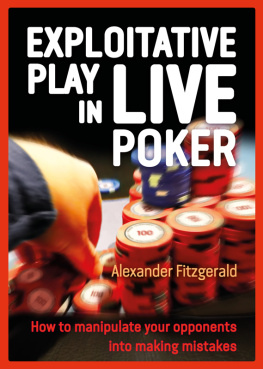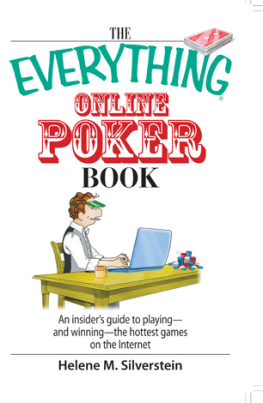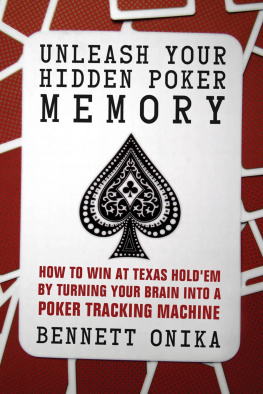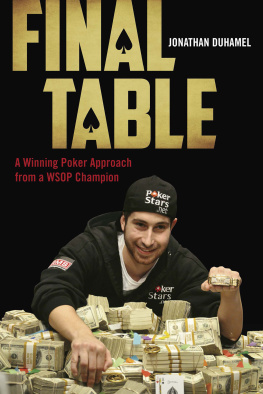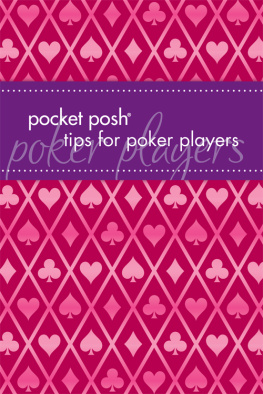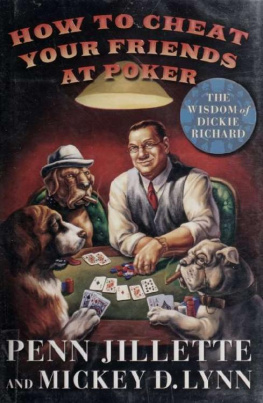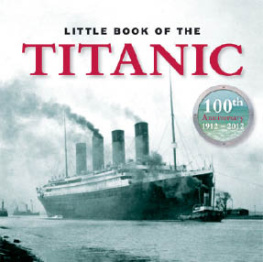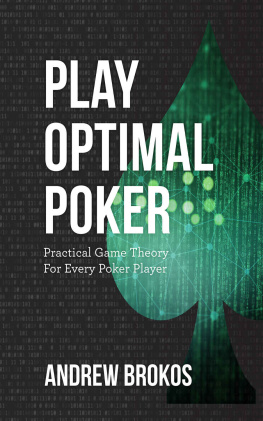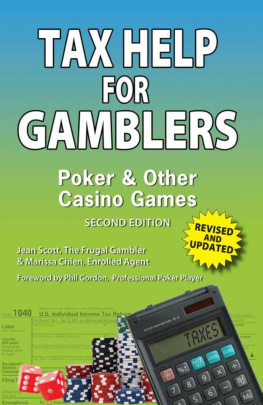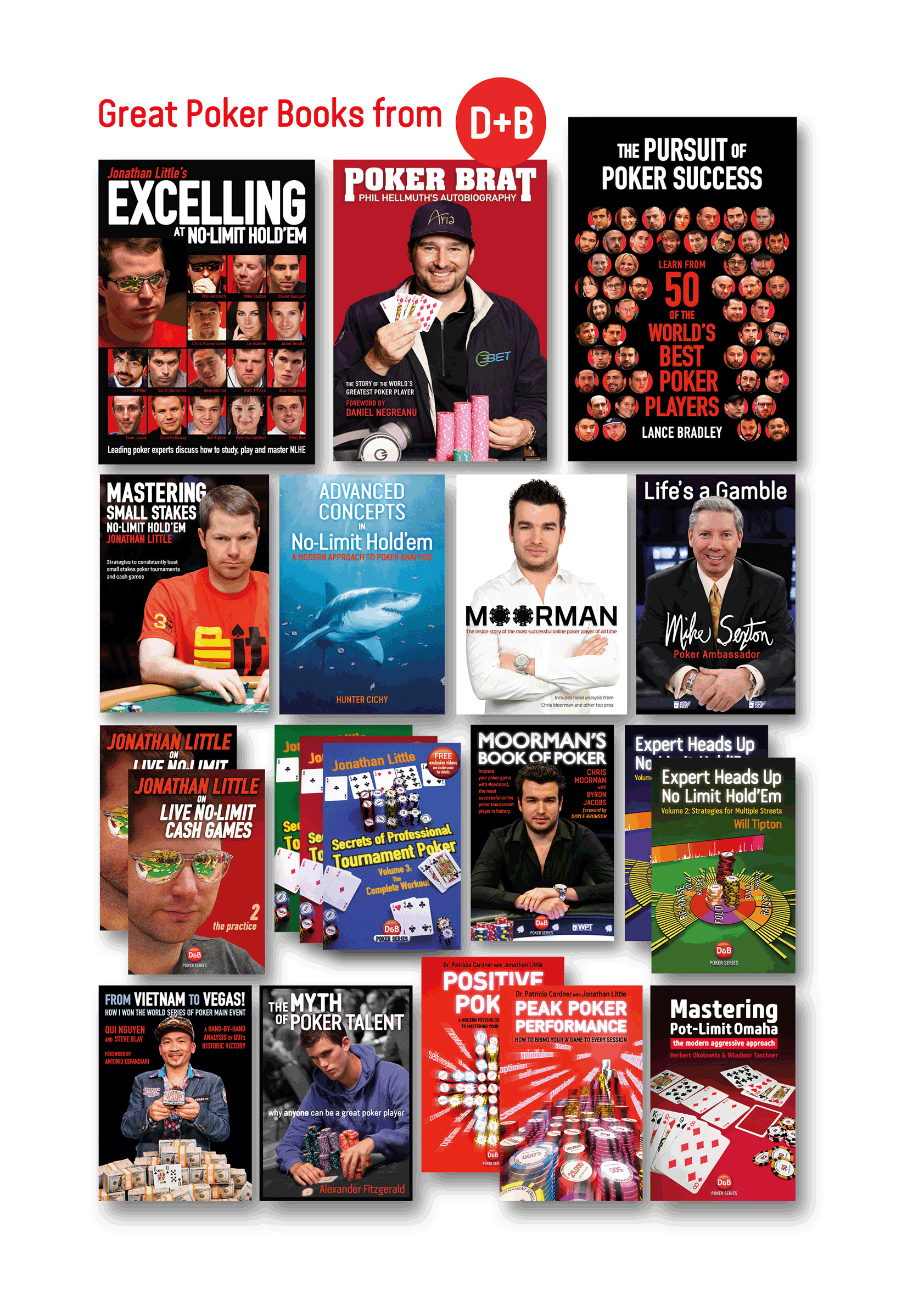Alexander Fitzgerald
Alexander Fitzgerald is a professional poker player who has been in the industry for over a decade. After running away from home during high school, Alex worked as a commercial fisherman and security guard, until he found success playing Texas Holdem. While describing himself as having average intelligence, Alex has been able to accrue more than $3,500,000 in tournament earnings around the world. This includes final-tabling EPT (European Poker Tour) and multiple WCOOP (World Championship of Online Poker) events, along with practically every regular tournament online. In addition to his extraordinary success as a player, Alex also runs a poker consultancy which serves more than 1,000 professional poker players in 60 countries. Constantly at work, Alex has published hundreds of training videos, articles, and webinars. He is regarded by many as the most important tournament coach in the world.
First published in 2018 by D&B Publishing
Copyright 2018 Alexander Fitzgerald
The right of Alexander Fitzgerald to be identified as the author of this work has been asserted in accordance with the Copyrights, Designs and Patents Act 1988.
All rights reserved. No part of this publication may be reproduced, stored in a retrieval system or transmitted in any form or by any means, electronic, electrostatic, magnetic tape, photocopying, recording or otherwise, without prior permission of the publisher.
British Library Cataloguing-in-Publication Data
A catalogue record for this book is available from the British Library.
ISBN: 978 1 909457 92 8
Cover and book design by Horacio Monteverde.
Printed and bound by Versa Press in the US.
All sales enquiries should be directed to D&B Publishing:

www.dandbpoker.com
ACKNOWLEDGMENTS
I would like to thank a hundred people for the fact I even get to write a book, but I will do my best to keep my thank yous short.
I would first like to thank Tawnie Baker for being there for me when few others were. If she had not taught me about the weight room and proper diet I doubt this book would exist.
I would also like to thank Jonathan Little for teaching me a great deal about writing for publication.
D&B Publishing deserve more than my thanks. They deserve a medal. This book is the culmination of notes I scribbled around the world as I taught my clients. It would not be readable in the slightest if Byron had not reorganised the material in a way that was far more palatable for the average reader.
I would also like to thank my students for so faithfully adopting my methods and reporting the results to me. I am far too insecure to put my name on something unless its been tried successfully hundreds of times. Without my students diligent work and thorough emails about what needs to be tuned up, this book would not exist.
I would finally like to thank the people and entities who deserve the most thanks: God, my mother, father, stepfather, and sister. I know many poker players who do not have support in their lives, so it means the world to me I have all of you in my own life.
And you, reader. I thank you. Ive been the Weird kid ever since the day I was born. But you fine people always adopted me as one of your own oddballs.
From the bottom of my heart, thank you for giving me a job in the greatest strategy game on Earth.
I cant wait to help you find your own success in this game.
Alex Fitzgerald
PART ONE
THE THEORY OF LIVE POKER
KEEPING IT SIMPLE
This Game is Not That Difficult
This game is not that difficult. Poker coaches just keep making it difficult for you. Did you ever play in a passive home game? Did you ever play in a poker game in 2004? Remember how everybody limped? Then one smart ass showed up. Hed visited a poker strategy site. Hed read a poker book. And he started raising. No one knew what to do, so they called him. Sometimes they beat him. More often than not, they didnt.
Eventually, everyone saw Gus Hansen raise anything on TV, and apparently always win. They wanted to be that guy too. So, slowly, over the years, they began opening anything. Thats as far as the game has gotten. If they are raising everything, you should be three-betting everything. Its like there are two big blinds now. The actual big blind and the obligatory raise most players make with 30% of their hands from late position. You would raise constantly if there were two big blinds, even if the second one only appeared with an announcement from the dealer stating, top 30% of hands has been declared; your action, sir. You would re-raise with 10-9o, Q-8s. All manner of hands you do not three-bet now.
Why Do You Care What They Think?
I consulted for gaming companies for years. Ive seen their books. Anywhere between 85 to 95 percent of players lose money at poker. The number is usually closer to 95 percent. This number only increases in live casino poker, as the rake increases. This means one thing: you are not playing well until everyone is making fun of you. If everybody sees your game and approves of it, that means you have gained the approval of losers. In order to win, you must ruffle their feathers and play in a style contrary to their unprofitable strategies. Does anyone ever notice you at the poker table? Or have you gained the acceptance of losers?
I Know You Care What They Think
How many times have you said to yourself, Wow, I cant believe he opened with that? When was the last time you did something about it? When was the last time you waged war against a table of weak openers? Or were you afraid of being the tables resident three-betting asshole?
Skin in the Game
If you do not take risks for your opinion, you are nothing.
Nassim Nicholas Taleb
In The Myth of Poker Talent, I discussed how to study. In Exploitative Play in Live Poker, I will discuss the conclusions of my studies. Equity calculators and data collection of live events will be condensed into easily understood macro lessons. Live poker is uniquely suited to my work, because 99 percent of the time in live play you know very little about your opponent. In those situations, you must make a judgment call on what the masses will do with an Ace-high or three of a kind. I will present my conclusions in a simple format. Most poker coaches refuse to do this because if you present an idea simply then you can be held accountable. If an idea is complex, the teacher can always say, You didnt understand me. You did it wrong. Your losses are your fault. If an idea is simple to implement and it does not work, then the student knows exactly who to blame.
Why Some Feel MOPT was Worth $5,000 a Copy
The Myth of Poker Talent was not the book I wanted to write. It was the book I knew had to be written. For those of you who did not read the book, my simple conjecture within the pages was, Poker is not a game of reading souls. It is a game of counting combinations. There is a way to use software to do this and through rigorous analysis and study you can synthesize the hand-reading skills that some top-level pros have. I wrote the book partially out of frustration from my lessons.

